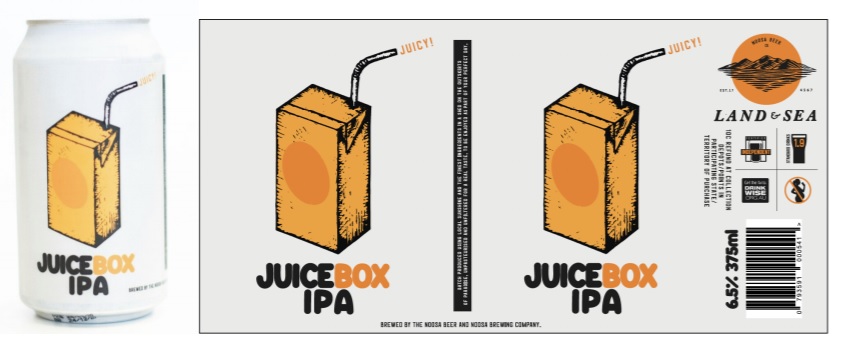
Juicebox IPA complaint upheld

Alcohol advertising watchdog ABAC has upheld a complaint against the packaging of Sunshine Coast’s Land & Sea Brewery’s juicy IPA.
The ruling highlights the challenges of marketing certain styles of beer, which do not necessarily have traditional alcohol descriptors that a “reasonable person” would understand, outside the craft beer fandom.
ABAC has previouslyupheld a complaint against Fixation’s Squish IPA for similar reasons as Land & Sea’s ruling, and has also warned against the use of the term milkshake.
Land & Sea’s response also called attention to the competition in an increasingly saturated market as brewers compete at venue and bottle shop level to stand out from the crowd.
The complainant in the latest ABAC ruling said they were concerned that the name and image of a juice box on an otherwise blank can “implies that the same contents as would be found in a juice box are provided in the can format”.
They also said that children could think it contains non-alcoholic juice and therefore has an appeal to minors, in addition to resembling a soft drink, both of which are stipulated against in the ABAC scheme.
Land & Sea responded by saying that it understood the argument regarding a potential appeal to minors, but argued that the rationale behind the design was to promote the citrus-style fruit flavours within the beer.
It explained that the beer was aimed at the “niche end” of the craft beer market, where, it said, it is important to stand out on a shelf of similarly-designed bright cans.
The brewery said that it formerly sold the product as a can similar in design to its core range.
“But for this niche style we were lost in the crowd somewhat so we decided to be a bit more direct and bold with our design and this was the outcome,” Land & Sea said in a written response to the ABAC judging panel.
The brewery also said it would be keen to work with ABAC on a solution in the event the can was deemed non-compliant, and would await feedback and redesign or change the packaging accordingly.
However it explained that there is an obvious cost to changing.
“I want to limit the ongoing loss of sales if any new design will have less appeal,” the response said.
The ABAC panel acknowledged that the brewery is not a signatory of the code and is not contractually obliged to abide by the code or the outcome of the complaints process, but said that Land & Sea fully engaged with the process and expressed its willingness to modify packaging if necessary.
In its judgement, the ABAC panel said that the can design does raise the prospect that it could be confused with a soft drink due to the depiction of a juice box image, colour palette and lack of alcohol descriptors.
It said a reliance on the term IPA means it would not have the same recognition factor in the wider community as it does amongst craft beer drinkers – an argument it also used in Fixation’s case – and the use of the word ‘juicy’ positioned next to an image of a juice box which further suggests it could be a soft drink.
The panel ruled that the packaging was inconsistent with the code in that the juice box imagery could appeal and is used extensively by minors.
It said because of all of the above it would likely have an attractiveness to minors beyond its appeal to adults, and the panel finally ruled that it was in breach of the ABAC code.



